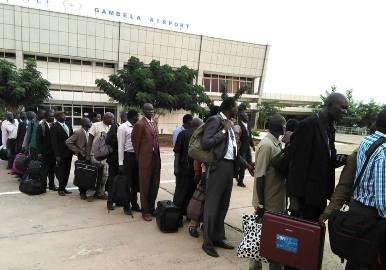SPLM-IO senior officials of advance team return to Pagak
January 19, 2016 (JUBA) – About 40 senior officials of the armed opposition faction, SPLM-IO, have left the national capital, Juba, this morning [Tuesday] and headed back to Pagak, their general headquarters, to consult with their top leadership on the deadlock reached between the parties over the implementation of the August 2015 peace agreement.

“Yes, the team has already left Juba for Pagak at around 9:30am. It is led by our Chief Negotiator, General Taban Deng Gai. This is to consult in Pagak as a collective leadership over the deadlock reached in the implementation of the peace agreement,” Machar’s spokesman, James Gatdet Dak, confirmed to Sudan Tribune this morning.
“The leadership consultative meeting may take about two days. If it will start on Tuesday they may return to Juba by Thursday,” he said.
The movement of the team, he said, has been facilitated by the United Nations Mission in South Sudan (UNMISS) which has provided two-way transport to Pagak and back to Juba.
The composition of the team include members of the armed opposition’s Political Bureau (PB), States Team Leaders, members of the Joint Military Ceasefire Committee (JMCC), National Constitutional Amendment Committee (NCAC) as well as members of the national secretariat.
He reiterated that the opposition faction is committed to full implementation of the peace agreement as it was signed by leaders of the parties to the conflict, including president Salva Kiir, opposition leader, Riek Machar, leader of former detainees, Pagan Amum, and other national, regional and international stakeholders.
He however explained that the main sticking points which threaten to derail the peace agreement implementation include the 28 states being imposed by the government into the constitution in violation of the agreement.
The unilateral creation of the controversial states, he added, has caused stalemate and delay in the amendment of the transitional constitution.
He also added that the parties could not agree on the locations of cantonment areas and the required implementation of the security arrangements provisions including demilitarization of Juba and deployment of joint military and police forces in the capital.
He said such provisions were required to be implemented first before a transitional government of national unity (TGoNU) could be formed by the parties.
He called on the government to revoke the decision and implement the peace agreement as was signed on the basis of the 10 states, adding that creation of more states will be tackled at a later stage in accordance with the mechanisms in the peace deal, such as in the writing of the permanent constitution during the transitional period.
The opposition faction also called on former President of Botswana, Festus Mogae, who heads the Joint Monitoring and Evaluation Commission (JMEC), a body established by the peace agreement to oversee and monitor its full implementation, to put pressure on the government to abide by the peace deal.
(ST)
